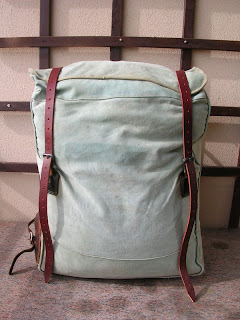Continuing with the
Recycled Woods Pack project, I had removed all the compromised leather components from the sturdy pack and now needed to clean up the canvas. I ended up using a pretty heavy duty cleanser,
TSP and it was very effective in removing most of the embedded dirt and grease, including the huge oil blot on the front. I'm not kidding when I say the wash water looked like black coffee after I was done. The great thing about canvas packs is the breathability of the material. Within a few hours of exposure to sunlight and the windy conditions on the balcony, the bulk of the pack (inside and out) was nearly dry. Below are the photos of the original condition and after washing.


Before and After shotsThe TSP also got rid of the left over gunk from the duct tape someone applied to the front (probably a temporary name tag from summer camp). Although the canvas is quite faded from years of exposure to UV, I don't mind the "aged look" and am not planing on redying the canvas.
Now for the leather parts. My intention is to restore this pack to usable function while not obviously spending a fortune. So the replacement leather I have on hand will not perfectly match the dark tone of the original leather, but will do the job. Below is a shot of the leather components that would make up the new shoulder strap rig.

New shoulder strap componentsThe original leather anchor where the shoulder straps were attached was small and degraded. Instead a larger patch of leather was cut out and would need to be hand stitched to the canvas, along with an identical piece on the inside of the bag. The outer piece is latigo leather and the inner piece a damaged piece of veg-tanned tooling leather that wouldn't really have much other use due to its cosmetic flaws. The stitching was tedious but made easier with a specialty stitching awl - a great investment for future leatherwork, as well as pre-punching the stitching holes. My stitching job isn't machine perfect but the leather anchors are quite secure.


Handstitching the leather anchors - exterior & inside the packWhile progressing with the stitching, the holes where the copper rivets would be inserted were marked and punched out. Once the anchors were in place, 3/4" number 9 copper rivets were pounded into place. The burrs were set with with a rivetting tool, the rivets snipped and the whole thing secured into place to form a very sturdy setup.


Copper Rivets outside; Burrs on the inside (before snipping)To finish off the straps, thinner 1" strips were rivetted to the main 2" wide shoulder straps. Didn't know which way the rivets should point, either with the burr facing out or facing in. In the end I opted on reversing the post so that the flat side would be on the inside of the straps and the preened rivet would slightly project on the outside. Duluth seems to do this with their packs and it makes sense from a comfort point of view to prevent the rivet from snagging on clothing when wearing the pack. Buckle holes punched every inch and this part of the repair all done.


Prepping the buckle straps; Rivetted and punchedNext up - repair to the top flap straps and the tumpline buckles. Next post posted
here.

















.jpg)


































